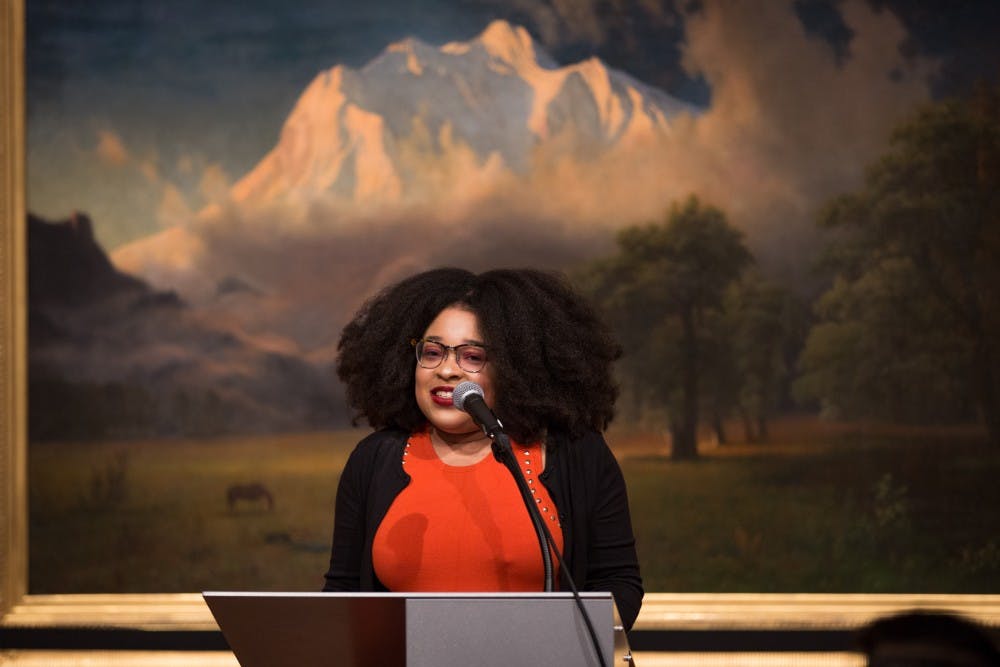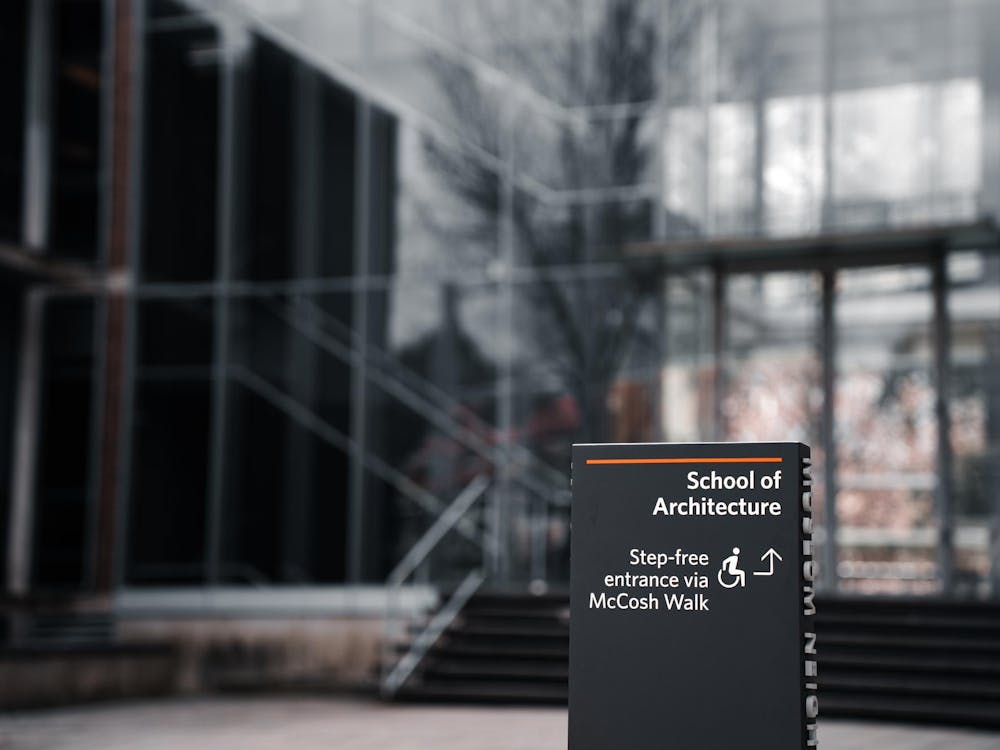Morgan Jerkins ’14 read selections from her book, This Will Be My Undoing, Feb. 28 at 4 p.m. at the Princeton University Art Museum. In advance of her lecture, the ‘Prince’ spoke with Jerkins.
When Morgan Jerkins ’14 drove into campus on Wednesday, she looked out the window at Elm Drive and was reminded of long evening talks in the Rocky-Mathey dining hall and morning brunches with friends in Wilcox.
Much has changed in Jerkins’ life since she spent her days racing back and forth between Princeton Faith in Action meetings near McCosh Hall and her dorm in Buyers Hall. In the five years since her graduation, Jerkins has secured a position as contributing editor at the literary magazine Catapult. Her writing has appeared in The New Yorker, The Atlantic, and Rolling Stone. Most recently, she published a New York Times bestselling essay collection entitled “This Will Be My Undoing.”
“A lot of times I'll sit back and think, ‘How did that happen?’” Jerkins said. “It felt like a whirlwind.”
Jerkins’ identity as a feminist black woman is at the heart of her new book. The essays in “This Will Be My Undoing” recount her personal experiences within broad contexts of historical oppression and modern pop culture.
Published in January, the book generated significant buzz in the literary world. It was named one of the Most Anticipated Books of 2018 by publications ranging from Vogue to the Huffington Post, and was praised by authors including Roxane Gay and Alana Massey.
Jerkins takes on a wide range of topics in the book, including therapy, the “Black Girl Magic” movement, dating, travel, and black female sexuality. Stories from college make an appearance as well.
“I had to talk about Princeton because it was so vital for me,” said Jerkins. “I couldn’t forget about the college experience.”

When Jerkins was accepted to University, her life was soon struck by tragedy. Her stepfather — her family’s primary breadwinner — died. Jerkins expressed gratitude for the financial aid package that allowed her to pursue her education, which included a free MacBook Pro that she still uses today.
As an undergraduate, she studied comparative literature, specializing in both the postwar modern Japanese era and nineteenth century Russian literature. She went on to earn an MFA from Bennington Writing Seminar, becoming fluent in six languages along the way.
“[Comparative literature] has helped me to remind myself that everything has a different side; there is no one objective truth. Depending on which location you’re in, which language you’re in, reality can shapeshift,” said Jerkins. “That has helped me out as a writer because I am always looking for nuance everywhere.”
While a student at the University, Jerkins gained not only intellectual skills but also a newfound political awareness. In her hometown community, Jerkins explained, “feminism” was seen as pejorative, an unaccepted symbol for overtaking or disrespecting men.

Jerkins’ conception of feminism changed as she was exposed to new people and ideas in college.
“I learned about misogynoir, the hatred of black women. I learned how there are people who didn’t fit in the gender binary,” said Jerkins. “Much of my political genesis came from Princeton.”
Jerkins could feel the historical precedent of African-Americans who had navigated the ultra-exclusive place that the University holds in society. This “added layer of exclusivity,” she said, motivated her to succeed and to hold herself accountable for her actions. She also became almost painfully conscious of the privilege that attending the University confers on its students. This, too, found its way into her book.
“I had to incorporate how educational privilege works and I couldn’t ignore that; that would just be irresponsible for me to not bring that up,” Jerkins said.
Whenever someone asked her where she went to school, Jerkins said, she would tell them “a school in New Jersey” rather than mention Princeton’s name. She added that other people of color have told her they do the same thing, afraid of sounding as if they’re bragging.
Jerkins was constantly aware of the unique advantages available for students on campus: the Nobel Prize-winning professor who can be seen walking across campus, or the MacArthur “Genius” Fellow teaching a morning lecture.
“Think about it: we have no homeless people here, no crime,” said Jerkins. “It’s very idyllic, but at the same time, it is a bubble because if you’re not careful you will think that other universities have these sorts of things, and they don’t.”
In 2015, Jerkins exchanged the shelter of the Orange Bubble for the chaos of New York City. There, she only had to hop on the subway to encounter a range of personalities, far removed from the carefully delineated social organization of undergraduate life.
“You’re in one of the greatest cities in the world, you’re meeting so many interesting people, and there’s something always going on,” Jerkins explained.
In the new environment, Jerkins began to pen the essays that would eventually form “This Will Be My Undoing.” She described the strict regimen she set for herself: Beginning to write every morning at 7:30 a.m., she would not leave her bed until she wrote 1,500 words. The mental challenge of the project was compounded by the deeply personal nature of Jerkins’ writing; she was running the risk of vulnerable exposure, of ad hominem attacks, of making the wrong conclusions when she turned to cultural analysis.
In the end, however, the rewards would outweigh the risks. “This Will Be My Undoing” was met with wide acclaim and popularity; Jerkins went on a national tour to promote the book and speak to readers. Suddenly, Roxane Gay was calling Jerkins “a writer to be reckoned with” and her book was climbing the New York Times bestseller list. Jerkins found the positive reception jarring at first.
“The last two lines are ‘Surprise. You should have known I was coming.’ That was like my resistance to imposter syndrome, because I was trying to say I was meant to do this, I deserve to be here,” Jerkins said.
Jerkins said she believes her book will be one of many on black feminism and womanhood, part of what she sees as a “black literary renaissance.” Since the publication of Roxane Gay’s “Bad Feminist” in 2014, texts by black authors that combine personal experience and cultural commentary have become increasingly common in bookshelves across the nation.
“Black women are extremely complex. Oftentimes we may be messy, we may be contradictory,” Jerkins said. “With this book, I hope that people will read about one black woman’s reality and not think that she speaks for all black women because I am not the arbiter of truth, I cannot monopolize black womanhood, much less blackness.”
She added that the writing process taught her the importance of self-care.
“When I was writing this book I did not take care of myself. I didn’t have a self-care ritual,” Jerkins said. “It wasn’t until late last year that I told myself you need to work out more, go to therapy more.”
Jerkins wants readers to read her book not only with respect to the outside world, but also to their own personal lives.
“I think we’re living in this political time period where we want to be as woke or conscious as possible,” she said. “I just want to tell people to make sure you prioritize your body and your mind, and know that the battle is long and hard, as it’s going to be there when you get back, but you can’t do anything if you’re weak.”








